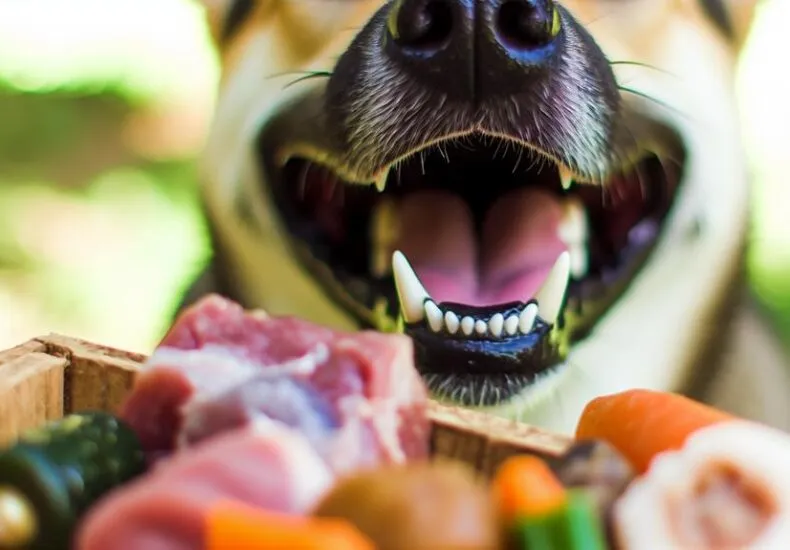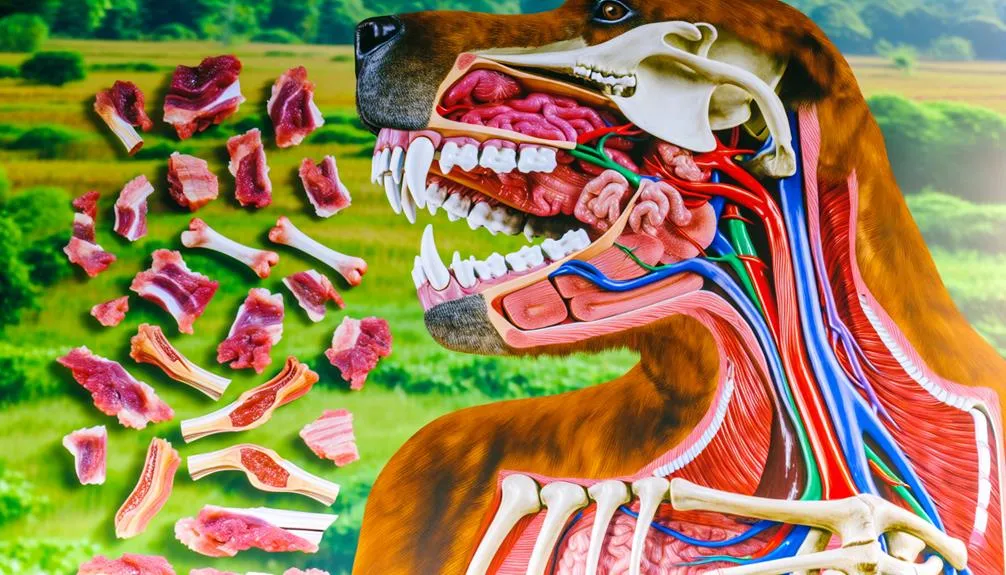
Are Dogs Carnivores
Much like the age-old debate about whether cats really have nine lives, the question of whether dogs are carnivores invites a closer look at their dietary classification. While you might assume that your canine companion shares the same eating habits as its wolf ancestors, the reality is more nuanced. Dogs have evolved to require a varied diet, blending both animal and plant sources. What does this mean for their health, and how should it influence what you choose to feed them? Understanding these facets could reshape your approach to their nutrition.
Understanding Dog Classification
Although dogs are often thought of as carnivores, their classification is more nuanced. You might be surprised to learn that dogs belong to the family Canidae, which includes various species with diverse dietary habits. Understanding dog evolution is essential to grasping their dietary preferences. As domesticated descendants of wolves, dogs exhibit traits from both carnivorous and omnivorous ancestors.
Throughout their evolution, dogs adapted to human environments, leading to changes in their dietary needs. Early domesticated dogs scavenged human waste, which included plant matter, thereby broadening their diet over generations. This adaptability suggests that while they possess carnivorous traits—such as sharp teeth and a short digestive tract—they can also thrive on a varied diet.
Research indicates that dogs have developed additional genes that allow them to digest starch and other carbohydrates, marking a notable evolutionary shift from their wolf ancestors. This genetic adaptation highlights a key point: while dogs may prefer protein-rich foods, they can also process and benefit from plant-based nutrients.
You should consider that a dog's dietary preferences can vary greatly based on breed, age, and individual health needs. This variability means that a one-size-fits-all approach to dog nutrition may not be suitable for every dog. Understanding these factors can help you make informed decisions about your dog's diet, ensuring they receive the balanced nutrition necessary for their health and well-being.
Ancestral Diet of Dogs
The ancestral diet of dogs primarily consisted of meat, reflecting their carnivorous lineage. Dogs share a significant portion of their genetic makeup with wolves, indicating that their dietary habits have evolved from those of their wild ancestors. The wolf ancestry of dogs plays an important role in understanding their nutritional needs and dietary preferences. In the wild, wolves thrive on a diet rich in protein, primarily derived from hunting large prey, which provides vital nutrients necessary for survival.
As dogs were domesticated, their dietary evolution began to diverge from that of their wolf ancestors. While early domesticated dogs likely continued to consume a meat-based diet, they adapted to the availability of human food scraps, which included grains and other plant materials. This dietary flexibility showcases the ability of dogs to adjust their eating habits based on their environment, leading to a more varied diet than that of wolves.
However, it is important to recognize that despite this adaptation, the core nutritional requirements of dogs still align closely with their carnivorous roots. This means that while dogs can digest a range of foods, their bodies are optimized for a meat-centric diet. Understanding the ancestral diet of dogs helps inform pet owners about the importance of providing a balanced diet that includes high-quality animal proteins, ensuring that they meet the nutritional needs that have evolved over thousands of years.
Digestive System Overview

Dogs possess a digestive system uniquely adapted to their omnivorous dietary needs, reflecting both their carnivorous ancestry and their ability to process a variety of foods. Understanding canine anatomy is essential for grasping how dogs digest their meals. Their digestive tract is relatively short compared to that of true carnivores, which aids in the rapid processing of food.
The mouth features sharp teeth that tear meat, but also flat molars capable of grinding plant material. This duality indicates their evolutionary flexibility in dietary habits. Once food is ingested, it undergoes enzymatic breakdown starting with saliva, which contains digestive enzymes like amylase that initiate carbohydrate digestion.
As food moves down the esophagus to the stomach, it encounters a highly acidic environment that further breaks down proteins, aided by pepsin, another digestive enzyme. In the stomach, food is mixed with gastric juices and converted into a semi-liquid substance called chyme. This mixture then passes into the small intestine, where the majority of nutrient absorption occurs, facilitated by additional digestive enzymes produced by the pancreas and the lining of the intestine.
The large intestine's role is primarily to absorb water and electrolytes, transforming the remaining material into feces. To sum up, the canine digestive system exemplifies an evolutionary adaptation that allows dogs to thrive on a diverse diet, reflecting their omnivorous tendencies while still maintaining a strong connection to their carnivorous roots.
Nutritional Needs of Dogs
When considering a dog's nutritional needs, it's essential to recognize that they require a balanced diet comprising proteins, fats, carbohydrates, vitamins, and minerals. These components play important roles in maintaining your dog's health and supporting various physiological functions. For instance, proteins are fundamental for growth, tissue repair, and immune function, and they should come from high-quality protein sources like meat, fish, and eggs.
Fats are another significant dietary component, providing energy and supporting cell structure. They also aid in the absorption of fat-soluble vitamins. When selecting fats for your dog's diet, it's important to focus on healthy sources, such as fish oil or chicken fat, which can also contribute to a shiny coat and healthy skin.
Carbohydrates, while not essential, can offer a valuable source of energy and fiber, aiding in digestion. Whole grains and vegetables can serve as beneficial carbohydrate sources, contributing to dietary balance. However, it's important to confirm that these do not replace the more significant protein and fat components.
Vitamins and minerals are necessary for various biochemical processes in your dog's body, from bone health to metabolic functions. A balanced commercial dog food typically contains these micronutrients in appropriate amounts, but if you're preparing homemade meals, you'll need to supplement accordingly.
Common Misconceptions About Diet

Many pet owners hold misconceptions about what constitutes a proper diet for their dogs, often influenced by outdated beliefs or marketing claims. One prevalent diet myth is that dogs are strictly carnivores and must eat meat exclusively. While it's true that dogs have a carnivorous ancestry, they are actually classified as omnivores, capable of digesting a variety of foods, including vegetables and grains. This flexibility in diet is a key factor in their overall health.
Another common misconception is that dogs will only eat what they instinctively prefer, which is often thought to be meat. In reality, dogs can develop preferences based on their exposure to different foods. If a dog is consistently fed a specific type of food, it may prefer that over others, but this doesn't automatically mean it's the healthiest option. Relying solely on perceived food preferences can lead to unbalanced diets.
Some owners also believe that commercial dog foods are inherently superior due to marketing claims. However, not all commercial diets are created equal, and many contain fillers or artificial ingredients that don't contribute to a dog's nutritional needs. Understanding the nutritional content is essential for making informed dietary choices.
Recommendations for Dog Owners
As you consider your dog's dietary needs, it is essential to adopt a balanced approach that reflects their omnivorous nature. While many dog owners may lean towards raw feeding, it is important to guarantee that any raw diet includes a variety of protein sources, such as meats, fish, and plant-based proteins, to meet all nutritional requirements.
Commercial diets can also provide a well-rounded option, offering convenience and balanced nutrition formulated by pet nutrition experts. When selecting a commercial diet, look for high-quality ingredients and verify it meets the standards set by the Association of American Feed Control Officials (AAFCO).
In addition to regular meals, dietary supplements can enhance your dog's health, particularly if they have specific needs or medical conditions. Consult your veterinarian to identify appropriate supplements, and remember that not all dogs will require them.
Establishing a consistent feeding schedule is crucial for your dog's digestive health and well-being. Regular meal times help regulate metabolism and maintain a healthy weight.
Don't forget about treat options! Healthy treats can be integrated into your dog's diet; consider fruits, vegetables, or specially formulated dog treats that complement their nutritional intake.
Ultimately, it is about balance. By combining raw feeding, quality commercial diets, and proper supplementation, you can guarantee that your dog thrives on a diet tailored to their needs. Regular veterinary check-ups will further assist in determining any dietary adjustments necessary for peak health.
Frequently Asked Questions
Can Dogs Survive on a Vegetarian or Vegan Diet?
You can feed dogs a well-planned vegetarian or vegan diet, but it's essential to guarantee it meets their nutritional needs. Proper plant-based nutrition can support canine health, though consulting a veterinarian is highly recommended.
Do Certain Dog Breeds Require Different Diets?
Imagine a thriving dog, its coat shimmering in sunlight. Different breeds have unique dietary preferences, requiring breed-specific nutrition. Tailoring their diets can enhance health, ensuring each pup flourishes according to its genetic needs and lifestyle.
How Does Age Affect a Dog's Dietary Needs?
Age greatly impacts a dog's dietary needs. Puppies require specific nutrition for growth, while seniors benefit from diets tailored to support joint health and digestion, ensuring their unique nutritional requirements are met throughout their lifespan.
Are Commercial Dog Foods Always Balanced and Safe?
Not all commercial dog foods offer balanced nutrition or safety. While some brands prioritize ingredient transparency and high food quality, others may compromise. Always research ingredients and consult your vet to guarantee your dog's dietary needs are met.
What Human Foods Are Toxic to Dogs?
When considering what human foods are toxic to dogs, be cautious of chocolate toxicity, onion poisoning, grape hazards, xylitol risks, avocado dangers, and caffeine effects. These can lead to serious health issues for your pet.
Conclusion
So, while you might think your dog's just a meat-loving carnivore, the truth is a bit more nuanced. They're actually omnivores, thriving on a mix of proteins, fats, and carbohydrates. You might imagine them howling at the moon for steak, but they also appreciate veggies and grains. Embracing this dietary flexibility can lead to a healthier, happier pup. After all, who knew your furry friend could have such sophisticated taste buds? Balance is key for their well-being.
You may also like
Archives
Calendar
| M | T | W | T | F | S | S |
|---|---|---|---|---|---|---|
| 1 | 2 | 3 | 4 | 5 | 6 | |
| 7 | 8 | 9 | 10 | 11 | 12 | 13 |
| 14 | 15 | 16 | 17 | 18 | 19 | 20 |
| 21 | 22 | 23 | 24 | 25 | 26 | 27 |
| 28 | 29 | 30 | ||||
Leave a Reply